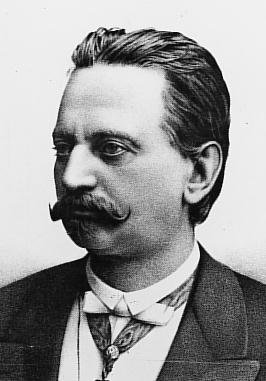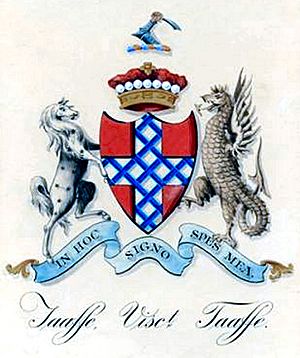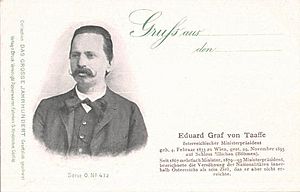Eduard Taaffe, 11th Viscount Taaffe facts for kids
Quick facts for kids
Hochgeboren
Eduard Franz Joseph
Graf von Taaffe, Viscount Taaffe
|
|
|---|---|

Count Eduard Taaffe, Viscount Taaffe
|
|
| Minister-President of Austria | |
| In office 12 August 1879 – 11 November 1893 |
|
| Monarch | Francis Joseph I |
| Preceded by | Karl von Stremayr |
| Succeeded by | Alfred zu Windisch-Grätz |
| In office 24 September 1868 – 15 January 1870 |
|
| Monarch | Francis Joseph I |
| Preceded by | Karl von Auersperg |
| Succeeded by | Ignaz von Plener |
| Minister of the Interior of Austria | |
| In office 14 April 1870 – 6 February 1871 |
|
| Prime Minister | Alfred Józef Potocki |
| Preceded by | Carl Giskra |
| Succeeded by | Karl Sigmund von Hohenwart |
| In office 7 March 1867 – 30 December 1867 |
|
| Prime Minister | Friedrich Ferdinand von Beust |
| Preceded by | Friedrich Ferdinand von Beust |
| Succeeded by | Carl Giskra |
| Personal details | |
| Born | 24 February 1833 Vienna, Austrian Empire |
| Died | 29 November 1895 (aged 62) Ellischau (Nalžovy), Bohemia, Austria-Hungary |
Eduard Franz Joseph Graf von Taaffe, 11th Viscount Taaffe (born February 24, 1833 – died November 29, 1895) was an important Austrian politician. He served twice as the Minister-President (like a prime minister) of Cisleithania. His first time in office was from 1868 to 1870, and his second, longer term was from 1879 to 1893.
Eduard Taaffe came from a noble family with roots in Ireland. They held titles in both the Holy Roman Empire and the Peerage of Ireland (in the United Kingdom).
Contents
Early Life and Family
Eduard Taaffe was the second son of Count Louis Taaffe. His father was the Austrian Minister of Justice during the Revolutions of 1848. This was a time of big changes and protests across Europe.
The Taaffe family had a long history of serving the Habsburg monarchy, which ruled Austria. They also owned large areas of land in Bohemia.
As a child, Eduard Taaffe was a close friend of the young Archduke Francis Joseph. Francis Joseph later became the Emperor of Austria. This friendship helped Eduard Taaffe have a successful career in politics.
He studied law at the University of Vienna and started working for the government in 1852. He held several important positions. For example, he worked in the government of Bohemia in Prague starting in 1861. In 1863, he became the governor of Salzburg. Later, in 1867, he became the governor of Upper Austria in Linz.
Eduard Taaffe married Countess Irma Tsaky in 1862. They had four daughters and one son, Henry. When his older brother Charles passed away, Eduard inherited the Irish noble titles.
Political Career
First Term as Minister-President
In 1867, Emperor Francis Joseph asked Eduard Taaffe to join the government. He became the Minister of the Interior. Soon after, he became the vice-president of the ministry. By the end of that year, he joined the first government of the new Austrian part of the empire. This government was called the Bürgerministerium, or "Citizen's Ministry."
For the next three years, Taaffe played a big role in the changing political scene. He often represented the Emperor's wishes. At first, he was part of the Liberal party. However, he soon tried to find a middle ground between the Liberals and those who wanted a federal system. A federal system would give more power to different regions.
From September 1868 to January 1870, Taaffe served as the head of the government. In 1870, his government faced a challenge over changing the constitution. Taaffe wanted to make some compromises with the Federalists. But the Liberal majority wanted to keep the power of the Imperial Council (the main parliament) strong. Both sides offered to resign. The Emperor sided with the Liberals, and Taaffe stepped down.
Second Term as Minister-President
The Liberals, however, struggled to form a new government. Many regional representatives refused to join the Imperial Council. So, Taaffe returned to office in April. He tried to work with the Czech people, but it didn't succeed. He then had to step aside for a new government led by Hohenwart.
Taaffe then became the governor of Tyrol. But in 1879, when the Liberal government collapsed, he was called back to a high position. He tried to continue with the same policies at first. However, he soon realized he needed the support of the Conservative and Federalist parties. He helped negotiate with these groups, which led to them winning a majority in the elections that year.
In July 1879, he became Minister-President again. He initially worked with the Liberals. But this became impossible, and he had to rely on the Conservatives for support.
During his time, laws were passed to help working-class people. These laws were inspired by ideas from Switzerland and Germany. They aimed to protect workers and improve their conditions. For example, the 1885 Trade Code Amendment was based on laws that limited working hours and provided benefits for workers.
Election Reform of 1882
One of Taaffe's most remembered achievements was his election reform in 1882. Before this reform, only a small number of men could vote. To vote, a man had to pay a certain amount of tax. This amount was often very high.
Taaffe's reform lowered the minimum tax amount needed to vote to just 5 guilders. This meant that many more men could vote. Before the reform, only about 6% of men in Cisleithania could vote. After the reform, more people had a say in their government. However, even after this change, there were still different classes of voters. A person's vote still counted differently based on how much tax they paid.
Policies on Nationalities
Taaffe achieved something very important: he convinced the Czechs to stop boycotting the parliament and to take part. His government's support came from the Czechs, the Poles, and the Clericals (religious parties).
His main goal was to unite the different groups of people in Austria. He believed that Germans and Slavs were both equally important parts of Austria. He said that neither group should be treated unfairly. Instead, they should work together to form a strong Austrian parliament. Despite growing opposition from German Liberals, who didn't want equal treatment for all nationalities, Taaffe held his position for thirteen years.
Later Years
In 1893, Taaffe's proposal to change the voting system was defeated. Because of this, he resigned from his position. He then retired from public life. He passed away two years later at his home in Ellischau, Bohemia.
Honours
Eduard Taaffe received many important awards during his life. These included the Grand Cross of the Imperial Order of Leopold and the Knight of the Golden Fleece from Austria-Hungary. He also received honours from other countries like Prussia, Russia, and Japan.
See also
- Eduard Taaffe
 In Spanish: Eduard Taaffe para niños
In Spanish: Eduard Taaffe para niños
Images for kids




